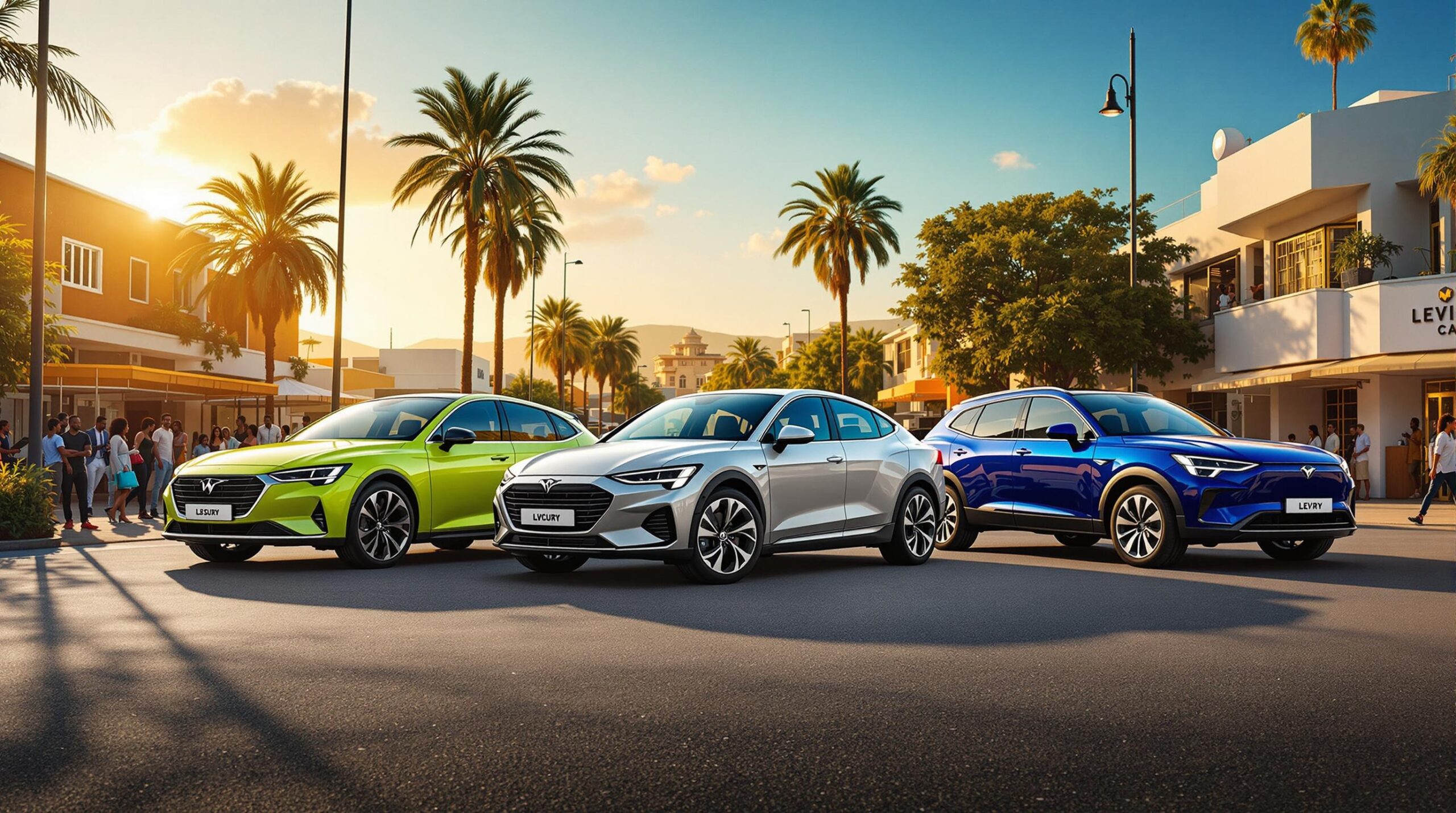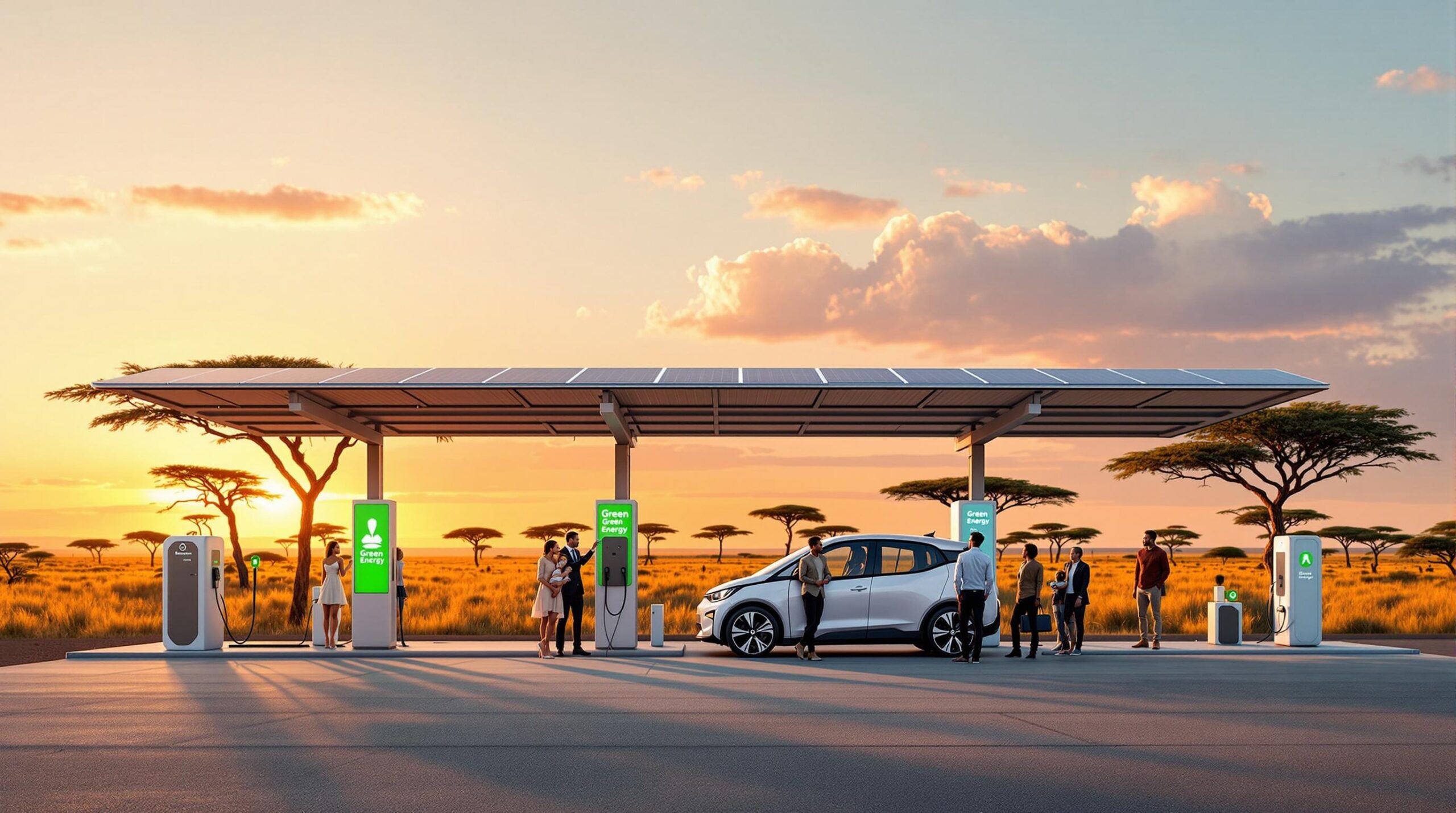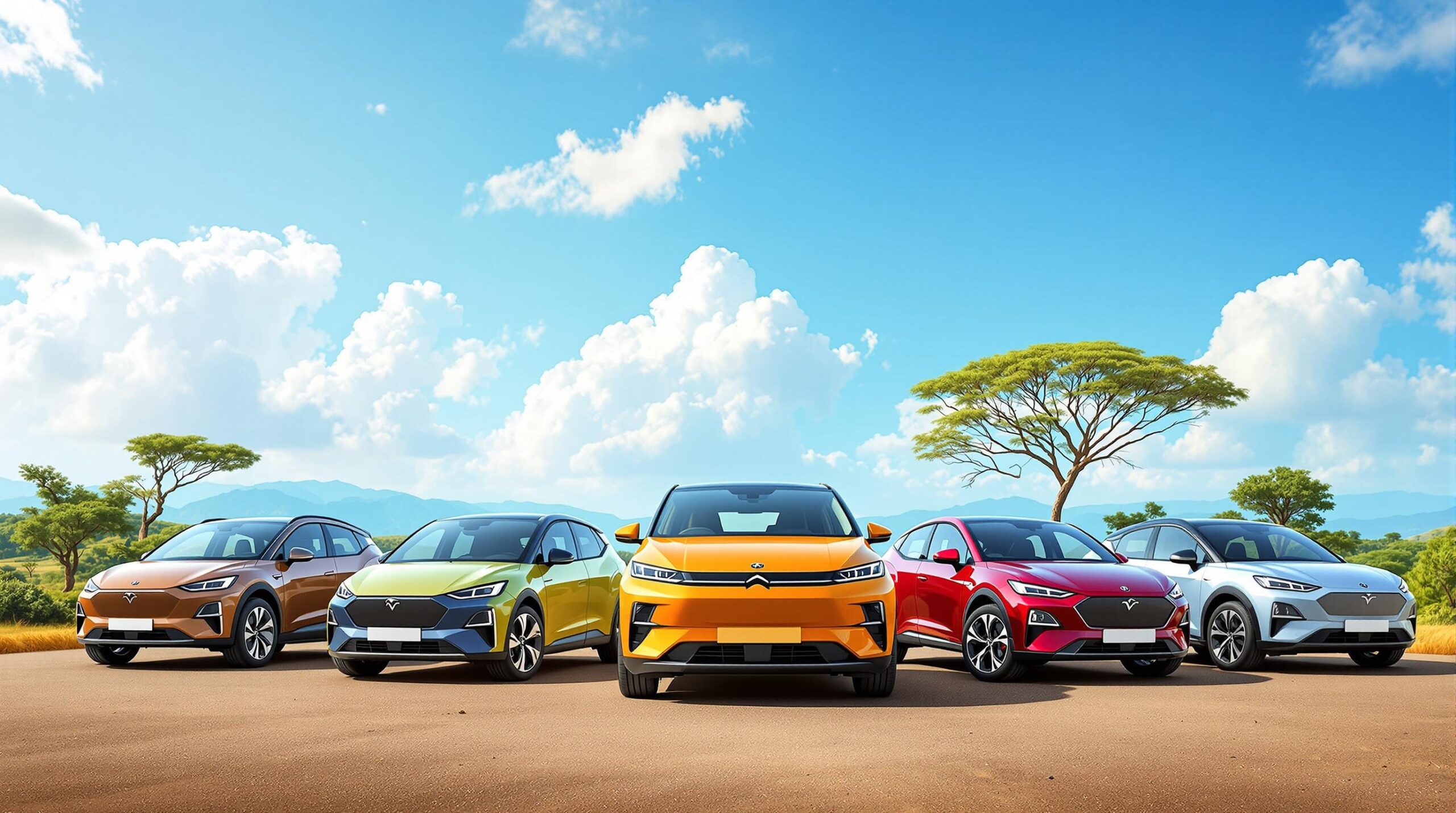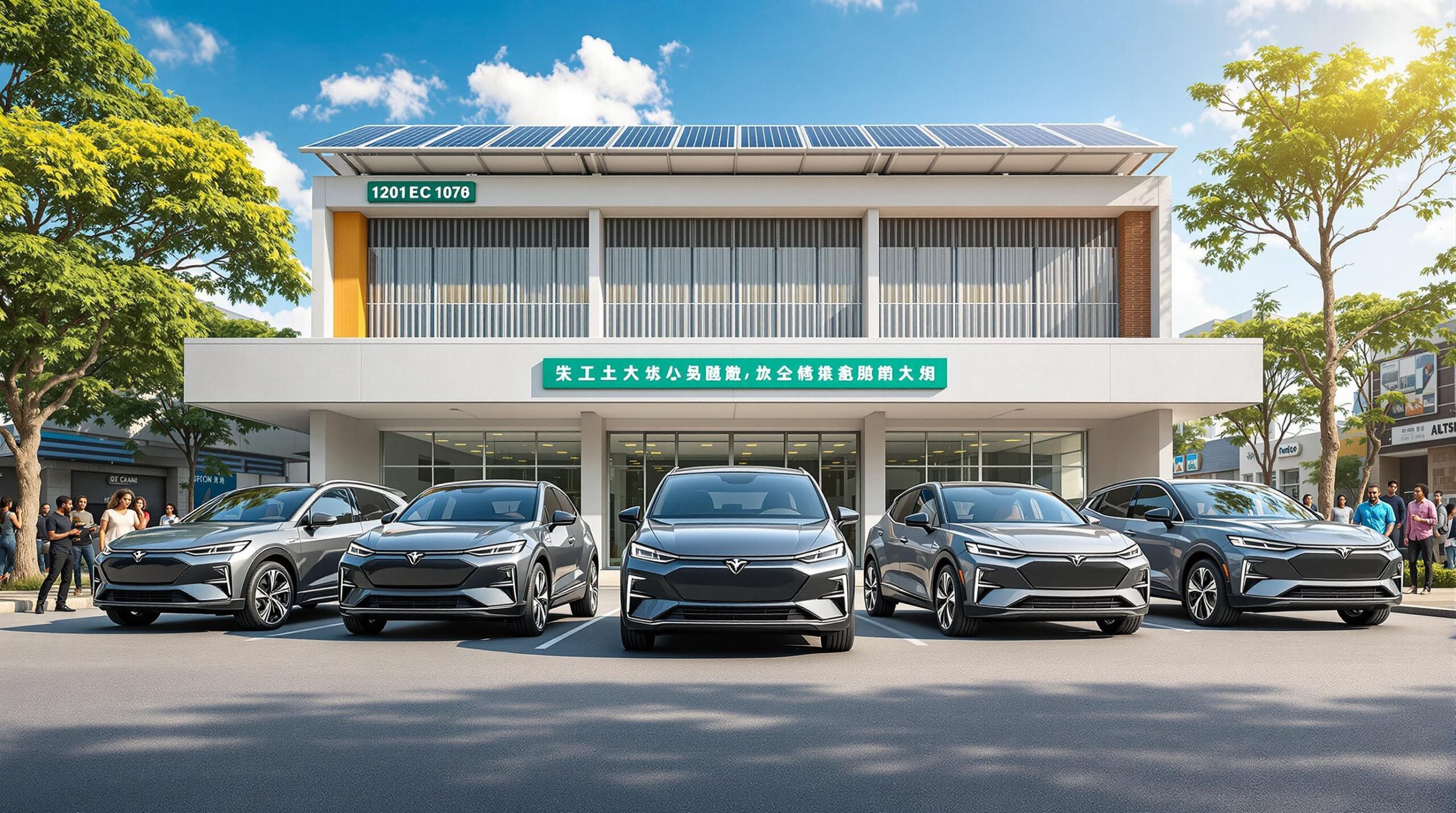
Africa’s electric vehicle (EV) market is growing fast, with Chinese EV brands leading the charge. By 2029, the market is expected to grow from $15.80 billion in 2024 to $25.40 billion, fueled by affordable pricing, local production, and tailored solutions for African needs. Here’s a quick look at the top five Chinese EV brands reshaping transportation across the continent:
- BYD: Leading the market with affordable models like the Atto 3 and Dolphin, BYD is expanding rapidly in South Africa, Kenya, and beyond. Prices start at $28,500.
- Geely: Known for the Geometry lineup and the upcoming RD6 electric pickup, Geely offers budget-friendly EVs starting at $13,000.
- Chery: With local assembly plants in Egypt, Senegal, and Zimbabwe, Chery focuses on durable EVs for African conditions.
- XPeng: While still new to Africa, XPeng plans to offer affordable options tailored to local infrastructure.
- Neta Auto: Entered Kenya in 2024 with the Neta V model, priced around $31,000, and a leasing program for taxi operators.
Quick Comparison
| Brand | Popular Models | Price Range (USD) | Key Markets | Unique Features |
|---|---|---|---|---|
| BYD | Atto 3, Dolphin | $28,500–$44,860 | South Africa, Kenya | Local partnerships, vertical integration |
| Geely | Geometry E, RD6 | $13,000–$35,000 | South Africa, Rwanda | Budget-friendly, electric pickups |
| Chery | Tiggo 8 Pro | $32,000–$45,000 | Egypt, Senegal | Local assembly plants, rugged designs |
| XPeng | P7, G3 | $35,000–$50,000 | Morocco, Egypt | Affordable and infrastructure-ready |
| Neta Auto | Neta V | ~$31,000 | Kenya | Leasing programs, expanding dealerships |
Chinese EV manufacturers are also investing in local production and charging infrastructure, creating jobs and making EVs more accessible. With fewer than 1,000 charging stations in Africa, these efforts are crucial for the continent’s transition to electric mobility.
China’s EV Invasion In Africa
1. BYD
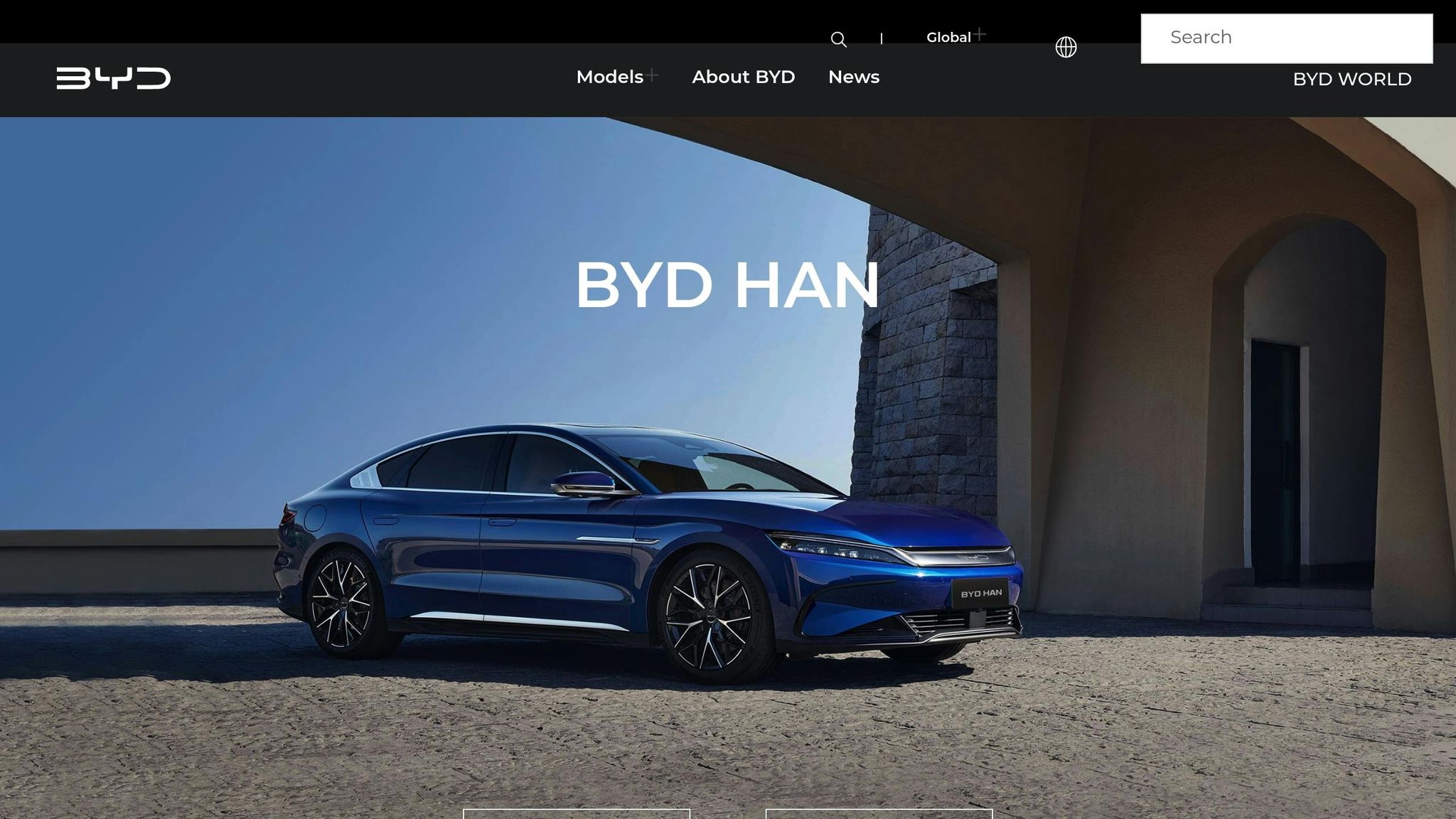
BYD leads Africa’s EV market as the world’s top-selling electric vehicle manufacturer, having sold 3 million electric and plug-in hybrid vehicles worldwide by Q4 2023 [6]. In 2023, the company saw a 334% increase in global exports, delivering 242,765 vehicles to 70 countries. This included a strong push into Africa, starting with the launch of the Atto 3 model in South Africa and later expanding to Rwanda through a partnership with CFAO Mobility [5][6]. These moves have helped BYD establish a solid foothold in the region.
In Kenya, BYD has made a notable impact through its collaboration with BasiGo and Associated Vehicle Assemblers (AVA). In January 2023, this partnership launched an electric bus assembly operation in Mombasa, with plans to produce 130 electric buses [6].
One of BYD’s key advantages in Africa is its competitive pricing. For instance, the BYD Atto 3 is priced between $41,260 and $44,860 – significantly lower than European models like Mercedes-Benz, BMW, and Audi, which typically start at $53,720 or higher [6]. Additionally, BYD offers several vehicles priced under $30,000, making them more accessible to African consumers [5].
"We get calls from companies like Rubicon [which runs charging stations] to find out how we are doing, because there’s simply not enough EVs selling in the country", says Steve Chang, BYD South Africa general manager [3].
BYD’s success in Africa can be attributed to three main factors:
- Vertical Integration: BYD manages its entire supply chain – from lithium mining and chip design to sea freight – helping them keep costs under control [6].
- Local Partnerships: Collaborations with regional assemblers and dealers help BYD enter new markets and support local economies.
- Government Support: In countries like Rwanda, BYD benefits from incentives such as lower electricity tariffs, VAT exemptions, and duty-free import policies for EVs [6].
2. Geely
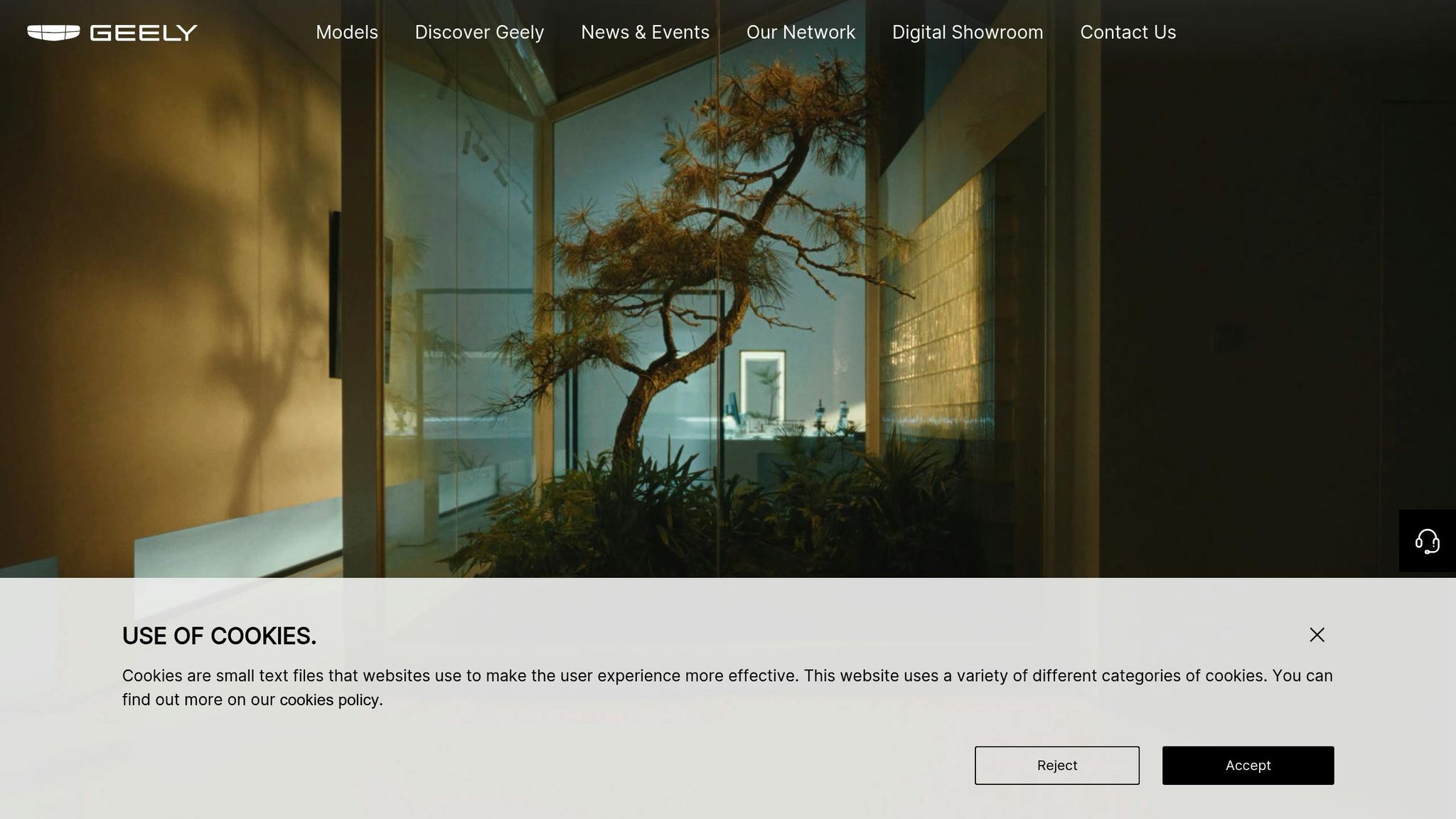
Geely plans to introduce the Riddara RD6 electric pickup to South Africa in 2025 through Enviro Automotive [9]. This move highlights the RD6’s mix of features and pricing. For context, South Africa sold only 1,257 battery electric vehicles out of 515,712 total vehicles in 2024 [9].
The RD6 offers three variants: Base RWD, Pro AWD, and Ultra AWD. These come with battery capacities ranging from 63 kWh to 86 kWh, delivering ranges of up to 455 km. Other features include a 70 L front trunk, a 1,200 L pickup bed, a towing capacity of 3,000 kg, and 6 kW vehicle-to-load functionality [9]. It combines the comfort of an SUV with the utility of a pickup.
Geely is also focusing on budget-friendly options with its Geometry lineup. The Geometry E, a subcompact crossover SUV, starts at about $13,000, with a long-range version priced under $17,000 [7]. Meanwhile, the Geometry C comes equipped with a 53 kWh battery, providing a range of approximately 400 km under the NEDC standard [8].
From 2023 to 2025, the RD6 dominated over 50% of the Chinese market [9]. With an acceleration from 0 to 100 km/h in roughly 4.5 seconds, it delivers both performance and everyday practicality [9].
3. Chery
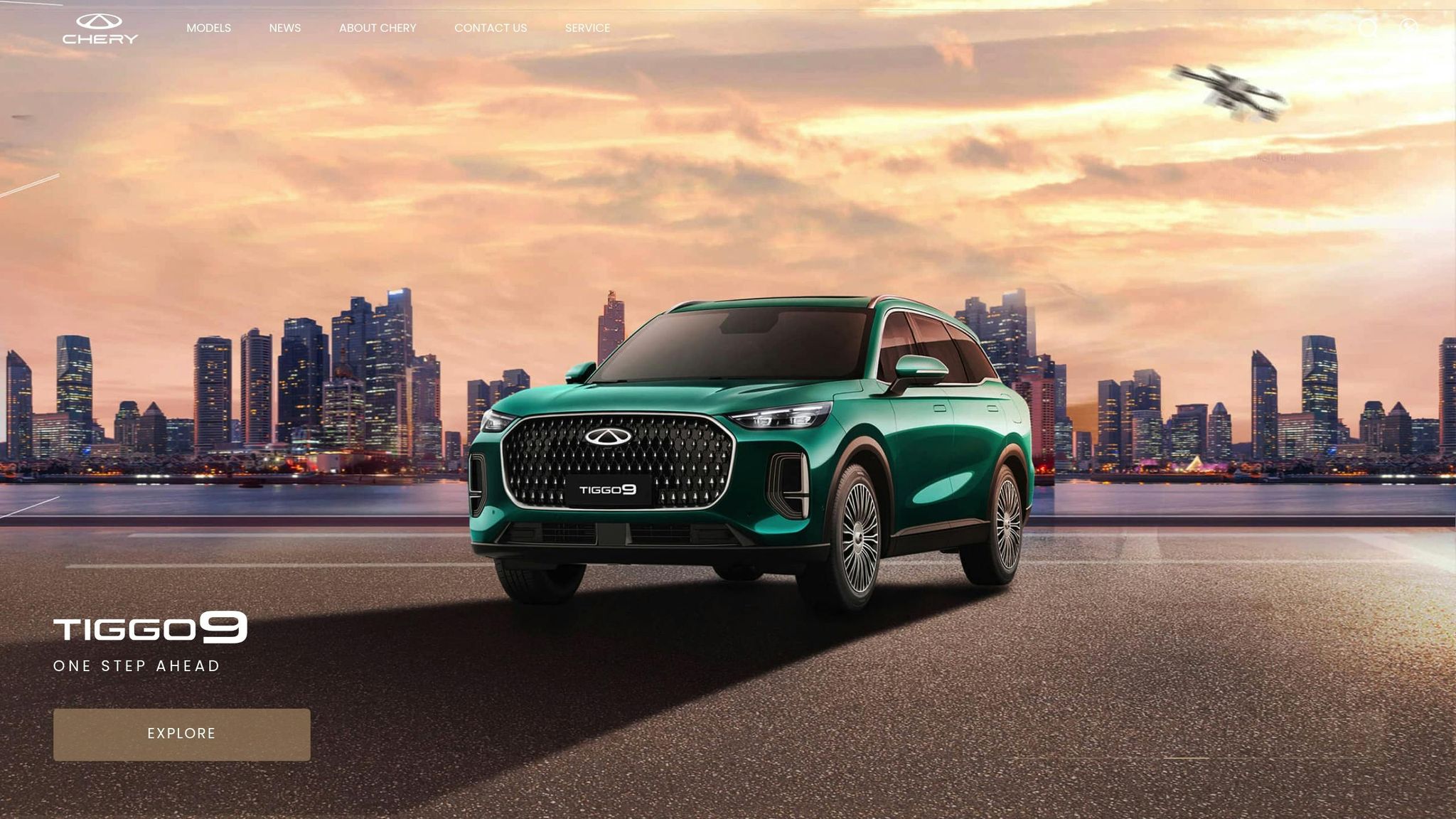
Chery has made a strong impact on Africa’s EV market, achieving a 143% export increase in 2024 and shipping nearly 30,000 vehicles – accounting for 16% of its yearly exports [10].
The company operates through a network of 200 dealerships and has established local assembly plants in Egypt (since 2005), Senegal, and Zimbabwe [10].
Chery adjusts its vehicle designs to suit local conditions, such as adding larger wheels and fuel tanks to handle tough climates.
"The market deserves special attention", says Huang Huaqiong, spokesman and assistant general manager of Chery Automobile Co [10].
Huang also emphasizes that while competitive pricing and after-sales service drive current sales, long-term success will depend on product quality and brand reputation [10].
| Chery’s African Market Presence | Details |
|---|---|
| Export Growth (2024) | 143% |
| Vehicles Exported (2024) | ~30,000 |
| Share of Annual Exports | 16% |
| Dealerships | 200 locations |
| Assembly Plants | Egypt, Senegal, Zimbabwe |
This focused approach highlights Chery’s growing influence in Africa’s EV market.
sbb-itb-99e19e3
4. XPeng

XPeng is starting to make moves in Africa, but specific details about its operations are still awaited. Industry experts predict that XPeng will likely focus on offering affordable options and ensuring its vehicles align with the region’s infrastructure needs, similar to the approach taken by other Chinese EV brands that have entered the market.
As with other players in Africa’s EV market, XPeng’s future strategy will play a key role in shaping its success. More information on its market entry plans, available models, sales performance, and partnerships is expected soon, which will provide better insights into its potential impact.
5. Neta Auto
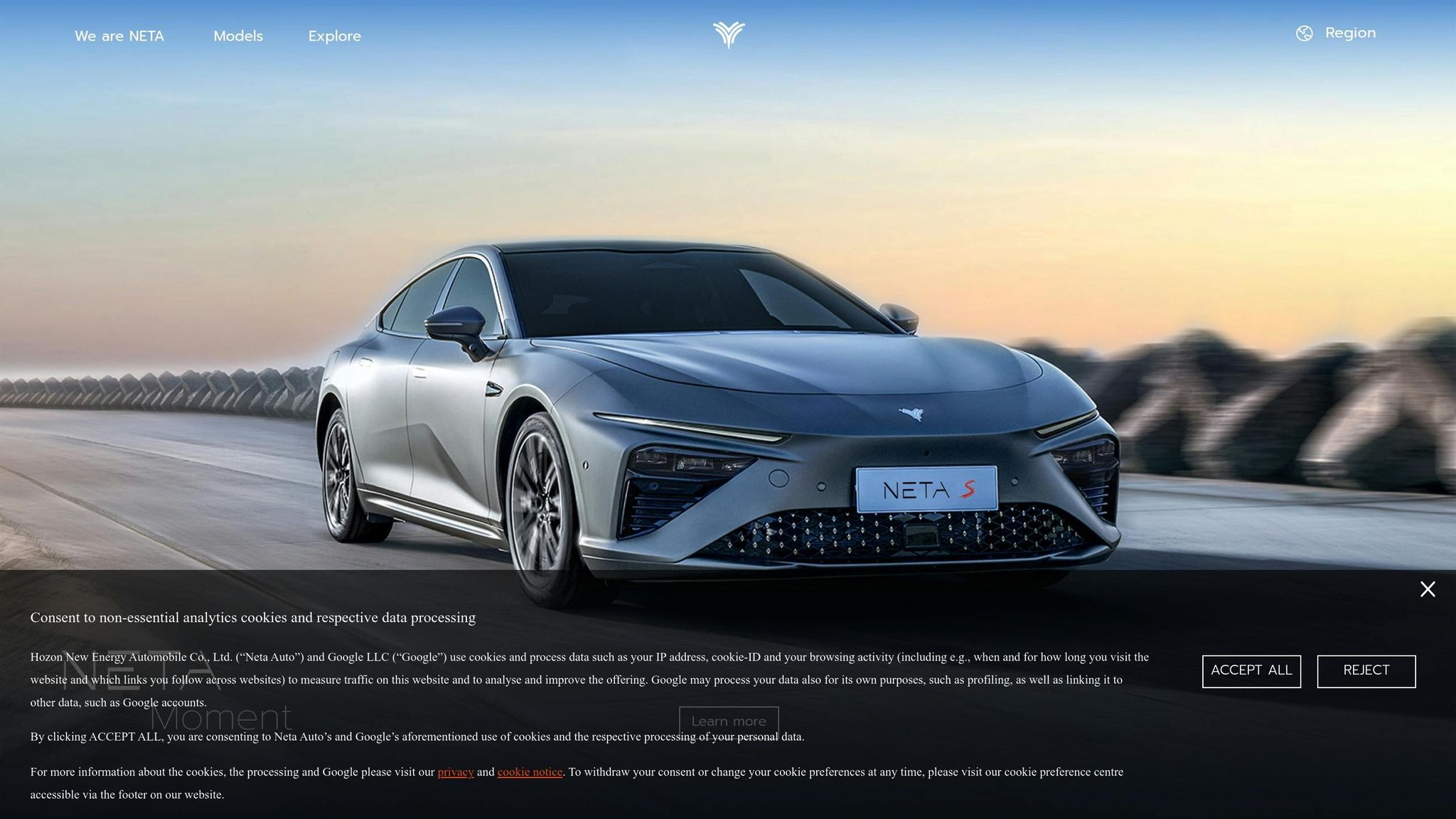
Neta Auto made its debut in Africa’s EV market by opening its first flagship showroom in Kenya on June 26, 2024.
The company’s flagship model, the Neta V, comes with a price tag of around $31,000 and offers a driving range of 380 km – perfect for both city commutes and inter-city travel.
To make EVs more accessible, Neta Auto teamed up with Moja EV Kenya on a leasing program. This initiative provides flexible leasing options starting at $30 per day, with deposits ranging from $387 to $772, based on the lease terms. Moja EV Kenya has already introduced 100 Neta V vehicles into Nairobi’s taxi market, with plans to expand this fleet to 500 cars by mid-2025. This program is a key part of Neta Auto’s strategy for growth in the region.
Lin Boqiang, Head of the China Institute for Studies in Energy Policy at Xiamen University, highlights the competitive edge of Chinese automakers:
"Chinese automobile manufacturers, with competitive advantages such as cost-effective production and a complete supply chain, are capable of offering vehicles at more competitive prices, making them more accessible to African consumers" [11].
Looking ahead, Neta Auto aims to expand into 20 African countries. Their ambitious plans include opening 100 stores, achieving over 20,000 annual sales, and starting local assembly with Kenya’s Associated Vehicle Assemblers, targeting 250 vehicles per month. New models like the Neta AYA and Neta X are also on the horizon.
Zhou Jiang, overseas business general manager at Neta, underscores Kenya’s importance:
"Kenya’s strategic importance as a regional economic hub and a gateway for exporting electric vehicles to the rest of Africa" [12].
Neta Auto is also focusing on building a strong service network and providing reliable after-sales support – key factors in gaining consumer trust and ensuring long-term success in the African market.
Brand Performance Overview
In 2024, Chinese EV brands have made a strong impact in African markets, with sales growing quickly and gaining attention across the region.
BYD leads the pack, thanks to its competitive pricing and impressive global sales. In South Africa, the Dolphin is priced at $28,500 (R539,900), while the Atto 3 comes in at $40,500 (R768,000) [3].
Here’s an overview of key models and market activity:
| Brand | Popular Models | Price Range (USD) | Key Markets |
|---|---|---|---|
| BYD | Dolphin, Atto 3 | $28,500 – $40,500 | South Africa, Zimbabwe, Kenya |
| Geely | Geometry E | $25,000 – $35,000 | Rwanda, Ethiopia |
| Chery | Tiggo 8 Pro | $32,000 – $45,000 | South Africa |
| XPeng | P7, G3 | $35,000 – $50,000 | Morocco, Egypt |
| Neta | Neta V | $31,000 – $40,000 | Kenya |
These numbers highlight the growing presence of Chinese EVs in Africa. For example, South Africa saw more than 3,000 new energy vehicle sales in Q1 2024, nearly matching the total for all of 2023 [3]. The Chery Tiggo 8 Pro alone sold 2,195 units during the first 11 months of 2023 [13].
In other regions, Chinese EVs dominate as well. In 2023, 87% of EVs cleared in Jordan were Chinese-made [4]. Ethiopian buyers have shown a preference for Chinese Volkswagen ID models [1], and Ghana now offers over 20 Chinese EV options [1]. These results underline the effectiveness of localized strategies.
The commercial sector is also embracing Chinese EVs. BYD has secured exclusive deals to supply electric vans in Zimbabwe and Kenya [1]. Meanwhile, models like the SAIC Maxus Delivery 3 and Dongfeng Sokon EC3 are becoming popular in South Africa’s logistics industry [1].
Looking Ahead
The future of Africa’s EV market is set for major changes as Chinese EV brands ramp up their efforts across the continent. With investments and partnerships already in motion, these companies are laying the groundwork for growth.
BYD, for instance, plans to expand its South African dealership network from five to 25 locations by the end of 2025 [3]. General Manager Steve Chang highlights their focus on affordability:
"What we are trying to do is get an EV here that costs between R300 000 and R350 000. That is where we need to go with the South African consumers." [3]
Similarly, NETA Auto has ambitious plans to enter 20 African countries, open 100 stores, and sell over 20,000 vehicles annually within three years [14]. These initiatives reflect a broader strategy by Chinese manufacturers to establish a solid foothold in Africa.
Currently, Africa has just over 20,000 electric vehicles and fewer than 1,000 charging stations [2]. To close this gap, Chinese companies are teaming up with local partners to build charging infrastructure and service networks.
Local manufacturing is also picking up steam. Ethiopian manufacturers have launched a large-scale electric car and truck plant [2], and several African nations are developing assembly plants to cut costs and boost job creation.
XPeng’s recent move into Egypt through a partnership with Raya Auto highlights growing interest in North Africa. Wang Ke, XPENG MEA region General Manager, expressed optimism about the market:
"Our company is confident in the promising opportunities that lie within the Egyptian market, and we are enthusiastic about introducing cutting-edge and environmentally-friendly electric vehicle technology to consumers in Egypt." [14]
With a mix of local manufacturing, infrastructure projects, and strategic alliances, Chinese EV brands are well-positioned to expand in Africa’s rapidly changing market.


